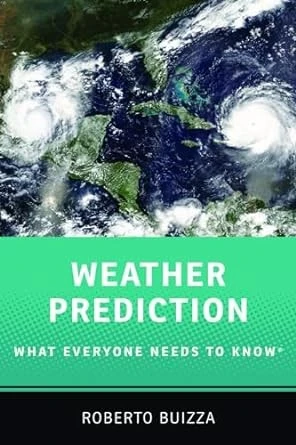
Weather Prediction: What Everyone Needs to Know®
(Author) Roberto BuizzaWeather has always affected human life. Understanding how weather events form and predicting what kind of weather is coming can help enormously to manage weather-risk and will become even more important as we shift towards strongly weather-dependent energy sources. Some big steps forward in numerical weather prediction have been made in the past 40 years, thanks to advances in four key areas: the way we observe the Earth, the scientific understanding of the phenomena, advances in high-performance computing (that have allowed the use of increasingly complex models), and improved modelling techniques. Today we are capable of predicting extreme events such as hurricanes and extra-tropical windstorms very accurately up to 7 to 10 days ahead. We can predict the most likely path and intensity of storms before they hit a community, estimate the confidence level of the forecast, and can give very valuable indications of their probable impact. Larger-scale phenomena that affect entire countries, such as heat or cold waves, periods with extremely high or low temperatures lasting for days, can be forecast up to 2-to-3 weeks before the events occur. Phenomena that affect a big portion of the oceans or of a continent and that evolve slowly, such as the warming of the sea-surface temperature in the Pacific Ocean when an El Nino event occurs, can be predicted months ahead, and in some cases even longer. Weather Prediction: What Everyone Needs to Know® discusses some of the key topics linked to weather prediction and explains how we got here. It discusses questions that are often asked, such as: how are weather forecasts generated? How complex are the models used in numerical weather prediction, and how to solve them? Was this event predictable? Why was this forecast wrong? How did you manage to predict this hurricane path 10 days before the event? Will weather forecast continue to improve, or is there a predictability limit?
Roberto Buizza
Roberto Buizza is an Italian author renowned for his novel "The Invisible City," a haunting exploration of identity and memory. His poetic prose and vivid imagery captivate readers, offering a profound reflection on the human experience. Buizza's work challenges traditional narrative structures, pushing the boundaries of contemporary literature.